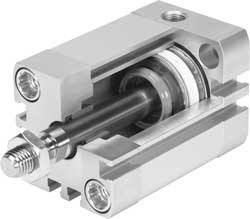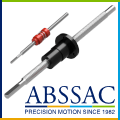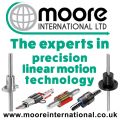
Posted to News on 18th Dec 2011, 20:19
ISO 21287 compact cylinders with self-adjusting cushioning
Many models in Festo's popular ADN compact pneumatic cylinder family are now available with an innovative self-adjusting pneumatic end-position cushioning system. Innovative cushioning ports allow the air to be vented in an optimal manner and adjust automatically to suit the prevailing speed and load conditions, thereby providing OEMs and machine builders with a true 'fit and forget' solution to the problem of cushioning.

Festo first introduced a form of pneumatic self-adjusting end-position cushioning - called PPS - on its DSNU family of round cylinders. However, incorporating the option on ISO 21287-standard ADN compact cylinders involved a different design approach due to these cylinders' more limited internal space. Festo says it has developed a unique design that places polymer cushioning seals either side of the main piston seal. As the cylinder rod approaches the end of its stroke, one of the cushioning seals enters a chamber in the end cap, with small ports in the seals allowing the cushioning air to escape in a controlled manner.
Festo is offering PPS cushioning on five different ADN models, spanning cylinder sizes from 32 to 80mm. Each of these is available with a choice of nine stroke lengths from 10 to 80mm as standard, though stroke lengths up to 500mm can be supplied to special order. PPS versions have the same physical dimensions as their ISO standard counterparts and are completely interchangeable, providing users with considerable design flexibility. For applications that involve twisting moments and lateral forces, Festo is also making the PPS system available on the ADNGF guided versions of the cylinder.
Automation applications
ADN compact cylinders are one of Festo's biggest sellers; they are used extensively in automation applications demanding small, robust pneumatically-operated actuators. Steve Sands, Festo's Product Manager, comments: "The introduction of pneumatic cushioning, which is unique on cylinders of this size, is set to increase their use even further, especially for applications where end-position shocks and vibration must be prevented, such as high-speed scanners and vision-based systems involving fragile electro-optics."
Compared with standard-size ADN cylinders, which use polymer end-position cushioning, the PPS versions are claimed to offer numerous advantages. The system provides highly repeatable cushioning characteristics, with up to 400 per cent better energy absorption, depending on the cylinder size. This leads to considerably quieter operation - a noise reduction of up to 50 per cent - and as much as 80 per cent less vibration. These attributes mean that machine designers can now elect to use cylinders of the same size to handle larger loads and speeds or to obtain increased actuator life-times, or they can use smaller cylinders to secure the same dynamic performance.
Another advantage of Festo's PPS system is that it requires no adjustment, making it a safe and maintenance-free option. Virtually all pneumatic actuators on the market that offer pneumatic end-position cushioning have adjustment screws. Setting up the end-position damping on these actuators can be a potentially hazardous procedure, involving exposure to moving parts. It invariably involves operating the machine under normal load conditions but without guarding, in order that trained personnel can adjust the actuator's damping characteristics in situ. Furthermore, final adjustments are usually made just before a machine enters service, which places personnel under considerable pressure to complete the task as quickly as possible. As a consequence, pneumatic actuators are often imperfectly adjusted, with under-damping causing higher end-position impacts, higher noise levels and increased wear, or over-damping causing longer machine cycle times. Either way, less than optimal adjustment results in decreased operating efficiency.
Festo's ADN cylinders with the PPS cushioning system are mechanically identical to the standard versions, and can be used with any of the mounting, coupling and auxiliary components that comprise this extensive family. All the cylinders feature longitudinal slots on three sides, offering very flexible mounting schemes. A proximity detector, the SMx-8M, can be inserted in any of these slots to detect the presence of an integral magnet on the cylinder's piston and provide confirmation of end-position.

































